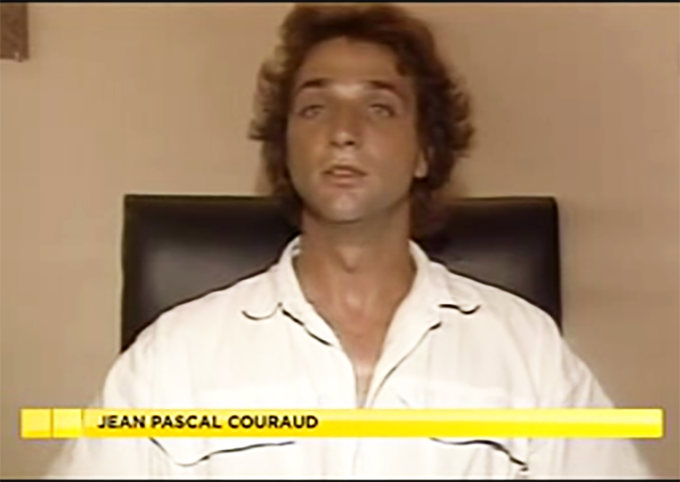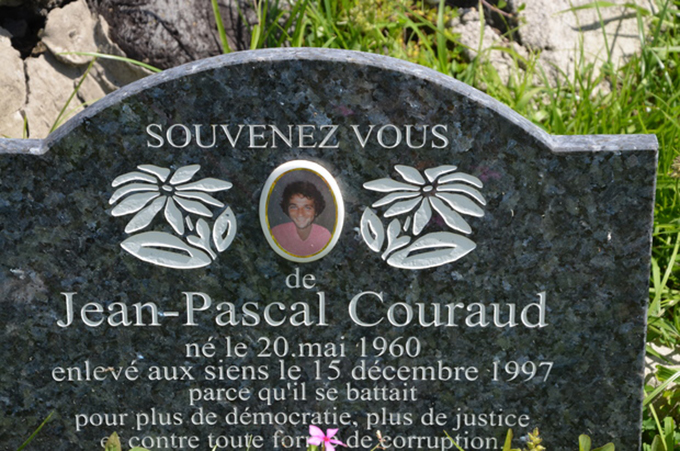
By Walter Zweifel of RNZ Pacific
It’s 20 years today since French Polynesian journalist Jean-Pascal Couraud vanished.
“JPK”, as he was widely known, left no trace, no body has ever been found. There is conjecture and speculation – and there are denials. Murder charges have been laid and they have been dropped.
Police investigations have been running since 2004 but for the lawyers of those suspected of kidnapping JPK “it’s more likely that yeti exists than Jean-Paul Couraud was murdered.”
Today, members of his family are at his empty grave in Punaaiua, remembering a son, a father, a brother.
They remain convinced that in 1997 he was the target of foul play and killed for researching the affairs of the then strongman and president Gaston Flosse.
Until 2004, Couraud’s family was led to believe that he might have committed suicide.
However, amid the political upheaval of that year, a former spy of the now disbanded intelligence service of Flosse told a minister that the journalist had been drowned.
Hit like a bomb
When the claim by Vetea Guilloux was repeated in the Territorial Assembly in the middle of a no-confidence debate into the pro-independence Temaru government, it hit like a bomb.
According to Guillox, two employees of the GIP militia, Tino Mara and Tutu Manate, kidnapped Couraud, maltreated him and after tying breeze blocks onto his body, they dumped him into the depth of sea between Tahiti and Moorea
The GIP was an unarmed militia led by Rere Puputauki, who in turn reported to Gaston Flosse.
Another branch of the Flosse apparatus at the time was an intelligence unit run by a former French spy, whose tasks included keeping an eye on political rivals and Gaston Flosse’s mistresses.
Vetea Guilloux was in the intelligence unit, his father had a top job within the GIP.
In the feverish political climate in late 2004, Guilloux was immediately arrested, tried, sentenced and jailed for slander.
The Couraud family, however, lodged a formal murder complaint, triggering an investigation which is yet to be concluded.
Switched sides
Gaston Flosse, meanwhile, succeeded in getting a Temaru supporter to switch sides and oust his first pro-independence government.
Defying the assembly leadership, he arranged a presidential election to be returned to power and while giving a policy speech, he swore that he had never ordered anybody’s death.

Like many observers, the publisher of the Tahiti Pacifique monthly Alex du Prel noted Flosse’s surprising declaration.
“He said he never gave orders for anybody to kill and everybody believed him. But he didn’t say nobody ever was killed.”
The case had an echo even in France where national television networks dispatched reporters to Tahiti. Also, Le Monde paid close attention to the JPK affair.
Gaston Flosse claimed he had been defamed by France 3 and took unsuccessful court action against its chief executive and a reporter.
He also pursued Le Monde for linking him to the 1997 disappearance of Jean-Pascal Couraud.
Slow investigation
JPK’s brother, Philippe Couraud, noted that the investigations were slow.
“The problem we had was between 2004 and 2007, three years, and it was very difficult. At this time, I was sure that the Justice did not want to help us. I mean, not Justice but the men who were there. So that’s why at this time, everything was organised to stop the enquiries.
JPK’s mother told TV reporters at the time about her disappointment with the judicial machinery, suggesting there had been obstruction.
Alex du Prel confirmed that: “We had state attorneys who admitted themselves that they had been appointed to protect Mr Flosse, and they did that job quite well actually.”
As a former minister in the Chirac government, Gaston Flosse had enjoyed cordial ties with Paris for a couple of decades, not least because he was a staunch supporter of the French nuclear weapons testing regime.
Things changed in 2007 when Jacques Chirac was replaced as president by Nicolas Sarkozy.
Pent up corruption complaints started to find their way through the courts and now Gaston Flosse is ineligible to hold public office having also become the most sentenced politician in contemporary France.
Murder charges
In 2013, the JPK affair saw murder charges being brought against Tutu Manate and Tino Mara after investigators surreptitiously recorded their phone conversations.
A year later, the charges were dropped over an apparent technicality.
“The phone taps were illegal because they didn’t have the right signature and the right explanation when they were ordered, so that kind of robs the smoking gun”, said du Prel.
Rere Puputauki failed to challenge the murder charge in time.
What is left are kidnapping charges against the three GIP men.
As for a possible motive for a killing, Philippe Couraud said he believed his brother had documents that could have damaged Gaston Flosse and his associates in Paris.
JPK had a career at the local newspaper Les Nouvelles de Tahiti and became its editor but was forced to quit under pressure from Flosse.
He subsequently joined the opposition politician Boris Leontieff as an advisor and worked for him when he disappeared.
Sensitive information
His brother Philippe said JPK had sensitive information.
“We discovered a paper of 12 to 13 pages which was in possession of my brother, and in fact it was because he had this information that he was killed,” he said.
Du Prel said the papers pointed to money being channelled via Japan, possibly to an account held by Jacques Chirac.
“At the time, they were looking into financing over in Tahiti and they saw that part of the money had gone to Japan. So the local representative to the state attorney had asked Paris for help to define where the money would have gone in Japan and he got a message back saying stop, do not enquire in that direction, you’re getting close to the top of the state. That, I published at the time and nobody ever denied it.
French media reports however said Japanese authorities had found no record of any bank account alleged to have been held by Chirac.
This came despite a French secret service report in 1996 mentioning it.
Whatever the possible reason for JPK’s disappearance, Philippe Couraud remains convinced his brother was killed.
“We are absolutely certain that my brother has been assassinated, and everybody who can read the files has the same conclusion,” he said.
Twenty years later and after 13 years of investigations, the only person taken court has been Vetea Guilloux for claiming JPK had been killed.
No wonder, there is the French expression ‘justice á deux vitesse’ – two-speed justice.
Walter Zweifel is a senior journalist with RNZ Pacific and a specialist in French Polynesian affairs. This article had been republished with permission.











































